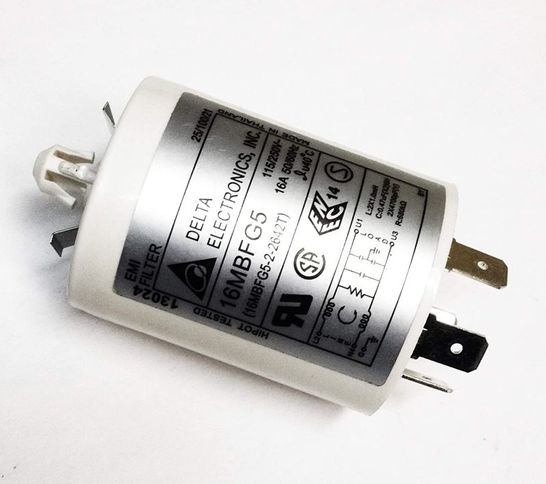EMI filters for high-reliability applications
An effective way to protect against the harmful impacts of electromagnetic interference
Oct. 06, 2021
Electronic devices play a vital role in nearly every industry, from hospitals, to industrial manufacturing and the military. Specific devices rely on uninterrupted and dependable electricity to operate correctly. However, as more and more electronic devices enter the market, they create electromagnetic interference that can cause these devices to malfunction, crash or fail. To protect electronic devices and systems from damage, EMI filters block adverse inferences and allow a steady flow of power.
What is EMI?
Electromagnetic interference (EMI) occurs when unwanted electric currents interrupt the intended currents an electronic device is supposed to receive. These disruptive currents — often called "noise" or "electromagnetic noise" — can come from an external source or get created by other components inside the device.
When EMI occurs, it disrupts the functioning of the device and can cause unintended operations to occur. Depending on the severity of the disruption, EMI may impact the quality of the signal the device receives, cause a component to fail or malfunction temporarily or permanently damage the electronic device.
What is EMC?
Another often-used term when discussing EMI is electromagnetic compatibility, or EMC. EMC describes how a device functions or performs in an environment of electromagnetic noise. EMC includes two factors — a device's tolerance to noise, also known as "noise immunity," and how much noise it produces. Devices must be able to operate correctly and securely in an environment with a certain level of electromagnetic noise and must not produce EMI at levels or frequencies that disrupt other devices.
Where does EMI come from?
EMI comes from both human-made electrical devices and natural causes. Human-made EMI is most often the result of electronics or electrical circuits but can also result from switching systems or changes in large currents. Human-made causes of EMI span both residential and industrial sectors, and some devices can also create interference between internal components.
Naturally occurring EMI can come from a variety of sources, including: lightning strikes, solar flares, cosmic noise, static electricity, atmospheric electrical storms, solar magnetic storms, dust storms, snowstorms, the sun.
Here are a few common causes of EMI in a residential setting: cell phones, laptops, Wi-Fi devices, Bluetooth devices, baby monitors, microwaves, toaster ovens, electric blankets, heating pads, heaters, lamps.
Industrial EMI can cause disruptions to hospitals, military operations and even the local power grid. Here are some common EMI sources in the industrial sector: electric motors and generators, cellular networks and telephone transmissions, television transmissions, radio and satellite, grid power, railroads and mass transportation systems, medical equipment, other high-frequency sources of EMI.
Why is EMI a problem?
EMI can cause a range of issues for residential and industrial devices, from a temporary impact to permanent damage. In its mildest form, EMI may cause annoying disruptions to the quality of performance of a device, such as poor cell phone reception. In more severe instances, EMI can lead to fatal consequences, such as failure or malfunction of essential medical equipment. The impact of EMI depends on many factors, including the duration of the interference, the environment in which it takes place and the noise immunity of the device.
What is an EMI filter?
EMI filters are an effective way to protect against the harmful impacts of electromagnetic interference. When attached to devices or circuits, EMI filters can suppress electromagnetic noise transmitted through conduction. These filters extract any unwanted current conducted through wiring or cables, while allowing desirable currents to flow freely. EMI filters that suppress noise from grid power are also called EMI power line filters.
Most electromagnetic noise is in a higher frequency range, so EMI filters are often low-pass filters that sift out high frequencies while letting lower frequencies pass through. Different EMI line filters suppress specific frequencies of noise, while allowing others to flow unimpeded. After the filtering process, electromagnetic noise gets diverted away from the device and to the ground. Some EMI filters may also route unwanted currents back to the noise source or absorb them.
Because EMI filters only protect against conducted EMI, they often pair with shields that block radiated EMI. An unshielded EMI filter can still transmit noise through the air to damage the device. Noise can get emitted from a wire on one side of the EMI filter and then travel to the device by recoupling with the wire on the other side.
Adding a shield at the attachment point of the electromagnetic interference filter can effectively block all forms of EMI. However, if there is only a small length of conductor between the filter and the source of EMI, using a filter alone can be sufficient.
EMI filter applications
Different EMI filters can apply in various ways to protect against damage most effectively from electromagnetic noise. Here are a few types of EMI filters in residential and industrial applications:
white goods EMI filters,
single-phase EMI filters for home appliances and electronics as well as industrial applications (food service equipment, power supplies and telecommunications),
three-phase EMI filters for use in high-power applications such as industrial machinery and motors, medical equipment, test equipment and industrial tools,
EMI filters for military,
medical-grade EMI filters.
Depending on the desired application, the impact of EMI filters can include shutting out undesirable electromagnetic noise and protecting devices and electrical systems from damage.
Nexum offers EMI filters for different applications, from 1-phase or 3-phase EMI filters to filters with IEC socket, power entry filters and chassis mounting filters. We also offer quality medical-grade EMI filters. Our partners for EMI filters are leading global suppliers XP Power, Delta Electronics and Enjoye Electronic. Contact our specialist for additional information about our offer of EMI filters. To find out more about EMI filters in our portfolio, you can also click here.
CONTACT
|
Aleksandra Memon Power Electronics | PCB Relays & SSR | PCB Connectivity T: +386 41 681 876 |



